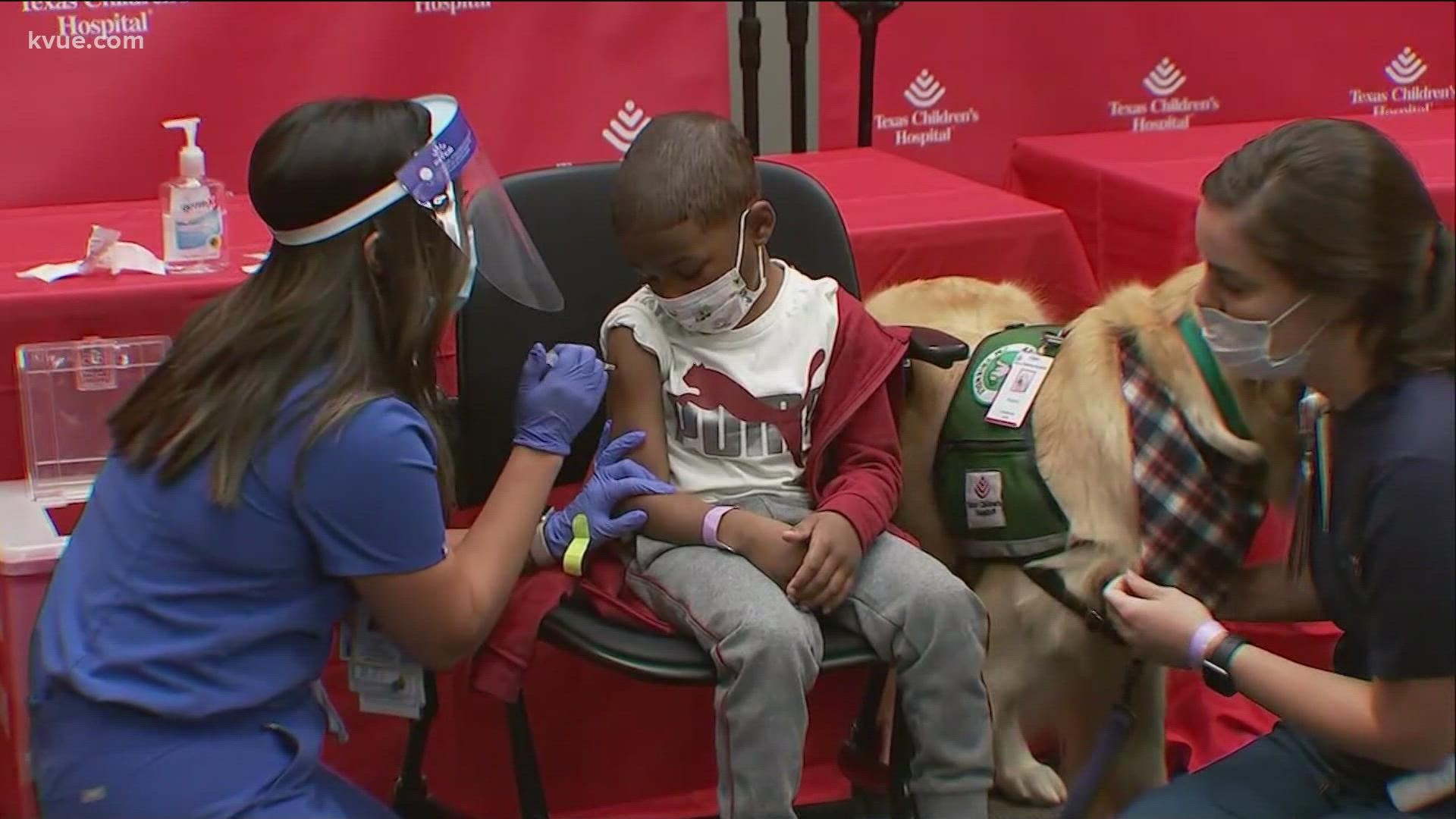AUSTIN, Texas — Children 5 years old and older are now eligible to get the Pfizer pediatric COVID-19 vaccine. Distribution has already begun around the U.S., but parents still have a lot of questions.
Dr. Stanley Spinner, chief medical officer at Texas Children's Pediatrics and Texas Children's Urgent Care, joined KVUE Midday to answer some of those questions.
Jenni Lee: First and foremost, the question is about availability. I know a couple of parents who are not able to set up appointments to get their children vaccinated. So, what should parents know and what do they need to do right now if they want to get their children vaccinated?
Dr. Stanley Spinner: "Well, so, we're working hard at – certainly in Austin, for our specialty center through Texas Children's – to make more appointments available. We are scheduling Tuesdays, Wednesdays and Thursdays. Tuesdays and Thursdays into, I believe, 7 p.m. in the evening. But I know that those slots are being rapidly filled. It's a great problem to have because we are excited that many families are wanting to get their kids protected as quickly as possible. We'll continue to add slots at Texas, you know, at the specialty center.
But, you know, working with the community in Austin, certainly, I would encourage families to look for other opportunities if those spots are not available at the specialty center at Texas Children's, that they could get their kids vaccinated through other entities throughout the Austin area. The goal is to get kids vaccinated. Who gets the vaccine is not as important as the kids getting those vaccines as soon as they can."
Lee: Sure, absolutely. And, of course, parents are concerned about these brand-new vaccines. Talk about the risk associated with the COVID vaccine for children.
Spinner: "Well, when it comes to the risk, I mean, the studies that were done on over 2,000 children in this age group really showed, you know, very, very mild and transient side effects. You know, soreness at the injection site, fever, low-grade fevers, you know, very mild symptoms. We have not seen anything of any concern in the studies of these kids. And when you look at the adolescents now that over 10 million doses have been given – certainly adults, hundreds of millions of doses been given of the Pfizer COVID vaccine – we continue to see an incredible safety profile with extremely, extremely low numbers of any types of side effects of consequence. Unfortunately, a lot of the information out there about significant side effects is just misrepresented.
We also understand the effects of the vaccine. It has been amazingly effective in adults, amazingly effective in adolescents. And the studies show the Pfizer vaccine in the pediatric population to be also, you know, very, very effective, over 90% effective.
I think the big issue is, for parents to understand is that children – this is not a benign disease for children. And so, that's certainly something that there's been a lot of confusion about. You know, that COVID is really more of a, of a concern for adults but kids have generally been spared. And early last year, I think when kids were at home with a lot of mitigating circumstances, home school, everyone wearing masks, we didn't see much of a pediatric infection issue. But this year, now the kids are back at school, masks have come off in many areas, we have seen a surge in the number of infections in children. And it's pretty much now, COVID is probably the third leading cause of death in children. Believe it or not, even though it's a small number behind cancer and heart disease, we've lost almost 600 children to COVID and well over 20,000 hospitalized. So, for even healthy kids, it could be a very, very serious infection and, certainly, something parents need to really appreciate the importance of protecting their children."
Lee: Third, leading cause of death. That is an alarming statistic. All right, I like that we underlined that Dr. Spinner. Doctors and other medical experts are recommending children get the flu shot right now. So, Dr. Spinner, what is the guidance on the timeline between the shots: the flu shot and the COVID-19 shot?
Spinner: "Well, you can get both the COVID vaccine and the flu vaccine at the same time. There is no restrictions on the timing of it. So, if someone has gotten their flu shot yesterday, they can get their COVID vaccine today or vice versa, or they can get their COVID vaccine today and their flu vaccine tomorrow. So absolutely no, no issues there. So, if you are able to get both at that one visit, I certainly would recommend it. But if that's not the case, again, get your flu shot when you can; get your COVID vaccine when you can.
We're seeing extremely low, low incidence of flu so far but, generally, we would expect to see more flu as we get into the winter. Last year was a true aberration. We saw virtually no flu. We don't expect that this year. We do worry that we will be seeing flu. And we understand that the flu vaccine can really help to minimize the severity of the flu, certainly. So, it is very important that we try to protect all of us, you know, with the flu vaccine as well as with the COVID vaccine."
If you have more questions about the COVID-19 vaccine for children, join KVUE on Wednesday, Nov. 10, for our "VERIFY: Kids & COVID-19" special. The special will stream on our KVUE YouTube page, KVUE.com and the KVUE app, as well as Roku and Amazon Fire TV.
PEOPLE ARE ALSO READING:

